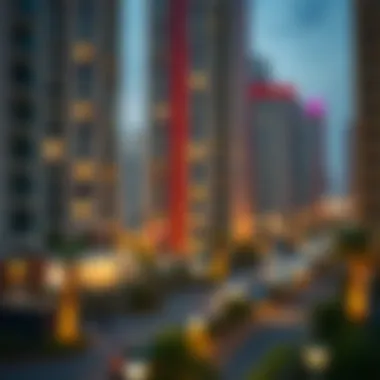Noise Regulations in Dubai: What You Need to Know


Intro
Navigating the bustling streets of Dubai, one might wonder about the cacophony that often fills the air. Cars honking, construction noises, vibrant street markets – it's all part of the city's pulse. However, the Dubai Municipality has laid down regulations to address noise pollution and ensure a more peaceful living experience for residents and businesses alike.
Understanding the noise regulations is essential for anyone involved in the Dubai real estate market or those looking to settle in this vibrant metropolis. With towering skyscrapers and bustling neighborhoods, noise management is not just about comfort; it’s about creating a livable space that reflects the city's ambitions and lifestyle.
This article aims to shed light on the specifics of these regulations, their implications, and how adherence can foster community well-being. By delving into the guidelines, we're opening the door to insights that will not only benefit current residents but also potential investors and homeowners looking to avoid future pitfalls.
Market Trends
Current Market Analysis
The property market in Dubai has evolved significantly over the last few years. Understanding how noise regulations shape both residential and commercial landscapes is crucial for anyone involved. Recent trends indicate that areas like Dubai Marina and Downtown Dubai, while trendy and sought after, also face scrutiny regarding noise levels due to their high density and lively atmospheres.
Interestingly, quieter suburban areas, such as Dubai Hills Estate, have become increasingly popular. Buyers are increasingly looking for properties that promise tranquility amidst the city’s vibrant life. In this context, noise regulations play a pivotal role. They set the standards for construction and operational hours, impacting property value and everyday comfort.
a. Demand for Noise Compliance
- Developers now face higher demands for noise-compliant designs.
- Mixed-use properties are evaluated based on their noise management strategies.
b. Public Awareness
- Residents are becoming more aware of their rights concerning noise levels.
- Community groups often advocate for stricter enforcement of noise regulations.
Future Predictions
The future of Dubai's urban soundscape hinges on a few key factors. As more residential communities emerge, it’s clear that noise management will remain at the forefront of planning discussions.
- Technological Integration
- Community Planning Initiatives
- Strengthening Regulations
- Smart home technologies will likely incorporate noise monitoring systems, allowing residents to take a proactive approach.
- Future developments may prioritize green spaces to buffer noise, enhancing residents’ quality of life.
- Increased focus by authorities on noise control measures suggests stricter regulations are looming for non-compliance.
Engaging in these emerging trends offers valuable insights for potential investors, as homes in quieter, well-regulated areas will inevitably hold more appeal in an increasingly noise-sensitive society.
Intro to Noise Regulations in Dubai
Noise regulations within Dubai serve a fundamental role in maintaining the social fabric and tranquility of bustling urban life. The rapid growth of this vibrant metropolis has led to a diverse range of activities, each contributing to an evolving soundscape that can become overwhelming if left unchecked. As Dubai continues to attract residents, expatriates, and investors, the establishment of clear noise regulations becomes crucial in managing the balance between development and community satisfaction.
One significant aspect of understanding noise regulations is their direct influence on public health. Prolonged exposure to elevated noise levels can lead to various health issues, such as sleep disturbances, stress, and even heart disease. Regulations help ensure a healthier environment, safeguarding the well-being of residents. Furthermore, by setting permissible noise limits, the municipality minimizes the likelihood of disputes between neighbors, enabling a harmonious coexistence among various demographics living in close quarters.
Considering the economic implications, noise regulations also play a vital role in preserving property values across the city. Investors and homeowners alike must recognize that a well-regulated noise environment can directly affect the desirability of a location. Higher noise levels can deter potential buyers or increase the vacancy rates of rental properties. Investors keen on the Dubai real estate market should remain cognizant of these regulations as they influence the dynamics of property investment.
Another critical component involves the cultural landscape of Dubai. The emirate is known for its rich tapestry of communities, each with unique customs and lifestyles. Striking a balance between cultural festivities and the need for quiet in residential areas is no small feat. The introduction of noise regulations reflects the city's commitment to accommodating diverse lifestyles while mitigating potential disturbances.
In summary, the importance of noise regulations in Dubai cannot be overstated. From enhancing public health and protecting property values to preserving the rich cultural heritage of the city, these regulations act as a foundation for the ongoing development of an urban environment that promotes well-being. For investors, homeowners, and the community at large, a clear understanding of these noise guidelines can provide invaluable insights into navigating life in this bustling emirate.
Historical Context of Noise Regulation
The historical backdrop of noise regulation in Dubai is crucial for understanding the present focus on noise management. This context sheds light on how cultural, socio-economic, and environmental factors shaped the guidelines now enforced by the Dubai Municipality. Recognizing where we came from helps us appreciate where we are heading, especially in a city experiencing rapid growth and urbanization.
Evolution of Regulations
The evolution of noise regulations in Dubai can be likened to the growth rings of a tree, with each layer representing significant changes made over decades. Initially, the need for noise control was far less pronounced, as the urban landscape was less dense and hadn't yet welcomed the influx of businesses and residents from around the globe.
As Dubai transitioned into a global hub, with an ever-growing skyline and bustling streets, the absence of a structured noise regulation framework became glaringly obvious. In the late 1990s and early 2000s, the government began to take steps towards formalizing noise control measures. For example, in 2005, the Dubai Municipality set its first specific limits on permissible noise levels, marking a significant milestone. These regulations not only aimed to protect public health but also to safeguard the city's reputation as a desirable place to live and work.
In subsequent years, adjustments were made to these regulations to accommodate the city’s evolving needs. This includes revisions made in 2014, reflecting contemporary understanding of urban noise dynamics and its impact on community lifestyle. As builders broke ground on high-rise towers and outdoor leisure venues, noise became a priority for many residents, leading to new amendments focusing on construction noise.
Global Influences on Local Laws
Dubai's noise regulations are also influenced by global trends and practices. As cities worldwide grapple with the impacts of urban noise, Dubai has looked to successful models from places like New York and London. These cities have long instituted noise control measures, recognizing that peace can be as valuable as the economic prosperity generated by vibrant urban life.
Furthermore, international guidelines from organizations such as the World Health Organization further inform local legislation. These benchmarks highlight the significance of noise pollution on public health, pushing Dubai to strive for similar standards. Adopting scientific research and case studies from abroad helps the city tailor its noise regulations to bridge the gap between cultural expectations and health implications ingrained in a society that values serenity amidst a bustling environment.
In summary, the historical context of noise regulation in Dubai serves as the foundation for the present-day frameworks. By understanding this past -- its evolution and global influences -- stakeholders, including investors, agents, expatriates, and homeowners, can better navigate the implications of noise regulations on their experiences in this vibrant city.


Key Objectives of Noise Regulations
The noise regulations set out by the Dubai Municipality serve multiple essential functions. Their primary aim centers around maintaining a peaceful environment, which is integral to fostering a vibrant community. These regulations not only protect individuals from excessive noise but also contribute to the long-term sustainability and livability of the urban landscape. Consequently, understanding these key objectives can offer profound insights to investors, homeowners, and local businesses.
Promoting Public Health
First and foremost, noise pollution has a deep-seated impact on public health. Excessive noise can lead to a wide range of health issues, including stress, anxiety, and even cardiovascular disease. Authorities recognize that a bustling city like Dubai, with its many activities and events, can generate significant noise. This is where the regulations come into play. By imposing limits on noise levels—particularly in residential areas—Dubai Municipality strives to ensure that residents enjoy a healthier living environment.
For instance, restrictions regarding construction works in residential neighborhoods ensure that early morning or late-night disturbances are minimized. This not only supports better sleep quality for inhabitants but also lowers anxiety levels among the public. Furthermore, promoting quiet zones such as parks reinforces the benefits of serenity within an often loud urban space. These considerations reflect a holistic approach toward public health that intertwines urban planning and noise control.
Enhancing Quality of Life
Another crucial objective is enhancing the overall quality of life for residents and visitors alike. Noise can quickly transform a peaceful neighborhood into an irritating tumult, driving people away from preferred areas or even impacting mental health. Regulations help to create a balance; after all, harmony within a community plays an essential role in resident satisfaction.
It’s not just about keeping the decibel levels down; it’s also about crafting a space that everyone can enjoy. When noise regulations are adhered to, families can partake in outdoor activities without the disturbance of unwanted sounds from nearby construction or loud events. Moreover, businesses benefit as well. Establishments like cafes and restaurants flourish in quieter environments, drawing more patrons eager for a tranquil meal or a peaceful cup of coffee. Thus, noise regulations are not just rules on paper—they actively shape the day-to-day experiences of all who call Dubai home.
Protecting Property Values
Lastly, the preservation of property values stands out as a significant objective. For investors and homeowners, the financial implications of noise levels can be paramount. Properties located in serene areas command higher prices, while those plagued by excess noise can see substantial depreciation. By regulating noise, the Dubai Municipality helps safeguard the aesthetic and economic appeal of neighborhoods.
When noise limits are respected, residents can enjoy their homes without the anticipation of disruptive sounds negatively affecting their living experience; property buyers are much more inclined to invest in silent, peaceful neighborhoods. As a result, the municipality not only fosters a healthy and enjoyable community but also ensures that investments remain sound. This creates an environment where everyone—residents, businesses, and investors—can thrive.
"Noise regulations are pivotal in creating a livable city, impacting everyone from families to investors."
Regulatory Framework Established by Dubai Municipality
The regulatory framework set up by Dubai Municipality plays a pivotal role in the management of noise pollution in the emirate. With the city's rapid development and growing population, effective noise control measures are essential. These regulations not only aim to protect the well-being of residents but also strive to facilitate a productive environment for businesses. By understanding the structured approach taken by the Municipality, stakeholders can better navigate through the complexities of urban life in Dubai.
Noise Levels and Permissible Limits
One of the cornerstones of this regulatory framework is the delineation of noise levels and permissible limits. The Dubai Municipality has established specific db (decibel) thresholds that dictate acceptable noise levels for various zones, such as residential, commercial, and mixed-use areas. For instance, standards dictate that residential areas should maintain a maximum noise level of 55 dB during the daytime and no more than 45 dB at night.
- Residential Areas: Maximum of 55 dB (daytime), 45 dB (nighttime)
- Commercial Areas: Typically allowed up to 65 dB (daytime)
- Industrial Zones: Can reach levels of 75 dB, taking into account the nature of the work.
This system not only provides clarity but also empowers residents and businesses to lodge complaints when noise levels exceed these limits. The presence of specific noise thresholds ensures that both the enjoyment of quiet and the operational needs of businesses are balanced effectively.
Time-Based Restrictions
Time-based restrictions further enhance the effectiveness of the noise regulations. These rules specify defined hours when certain activities can occur, especially those that generate considerable noise. The aim is to protect residents' peace during the night when they have a strong need for rest.
During nighttime hours, which typically span from 10 PM to 7 AM, more stringent limits are set. Activities like construction or loud machinery operations are generally prohibited during these hours. This aspect of the regulations echoes the commitment by authorities to promote a healthier living environment:
- Daytime Activities (7 AM to 10 PM): Higher tolerance for noise levels.
- Nighttime Restrictions (10 PM to 7 AM): Severe limits to minimize disturbance.
Adherence to these time-based rules is essential for maintaining harmony within the community. Failure to comply can lead to penalties and community discontent.
Designated Quiet Zones
The concept of designated quiet zones is a strategic component woven into the broader framework. Certain locations, such as parks, hospitals, and schools, are classified as quiet zones, where noise restrictions are even more stringent. The aim is to create havens of tranquility amidst the bustling activity of Dubai.
- Parks and Recreational Areas: In these spaces, noise levels are limited to detrimental effects on nature and well-being.
- Educational Institutions and Hospitals: Special attention is given to these areas, with noise levels requiring stricter adherence.
By establishing quiet zones, the Dubai Municipality acknowledges the need for areas free from urban noise interference. For investors, understanding where these zones are located becomes critical, as proximity to quieter areas can enhance property values and overall quality of life.
Understanding these frameworks gives residents and businesses crucial insights into how best to operate within the city while respecting the shared need for a balanced urban environment.
Noise Sources and Regulation Compliance
Noise pollution has become a pressing issue in urban landscapes, and Dubai is no exception. Understanding the sources of noise and how they are regulated is essential not just for compliance but also for maintaining a quality living environment. The breadth of this issue encompasses various sectors, from construction sites to bustling commercial spaces and large public gatherings. A comprehensive grasp of noise sources enables investors, homeowners, and local businesses to navigate the regulatory framework more effectively, ensuring both legal adherence and community well-being.
Construction Activities
Construction activities, including roadwork, building projects, and renovations, are some of the most intrusive noise sources in Dubai. The Dubai Municipality has specific noise limits for these projects to mitigate disturbances to nearby residents. These regulations are not merely red tape; they serve a vital purpose.
Key points to consider:
- Permissible Noise Levels: During the day, construction noise must stay below a set decibel level. However, restrictions become more stringent after sunset.
- Time Restrictions: Construction is usually prohibited during late hours to reduce disturbances.
- Community Impact: Reducing construction noise not only fosters better living conditions but also enhances property values in surrounding areas.


By adhering to these regulations, construction firms can build trust and goodwill in the community while also avoiding substantial fines.
Commercial Operations
Businesses, whether they are restaurants, retail stores, or entertainment venues, contribute significantly to the noise levels in Dubai. Each type of operation has its noise benchmarks that must be respected to foster a harmonious coexistence with residential zones. The regulations address various sources of commercial noise, such as:
- Music and Entertainment: Establishments that offer live music or DJ performances must ensure sound levels do not breach established limits.
- Outdoor Operations: Cafes and restaurants with outdoor seating need to consider how conversations and equipment, like ice cream machines or generators, can escalate noise levels.
Understanding these regulations is crucial for business owners to avoid disruptions. Failure to comply can lead to operational restrictions or even the suspension of licenses, reinforcing the need for compliance.
Public Events and Gatherings
Public events, from cultural festivals to sporting events, serve as a backdrop for social interaction but can generate noise that disrupts local communities. Local laws dictate the maximum allowable sound levels and the times at which high-decibel events can occur.
Considerations for compliance include:
- Pre-Event Notifications: Organizers must inform nearby residents ahead of time about potential noise impacts. This practice fosters goodwill and prepares them for upcoming noise.
- Permits and Licenses: Many events require permits that stipulate sound level restrictions and operational times.
- Post-Event Clean-Up: Beyond noise, organizers are also responsible for ensuring that the area is cleaned and that any noise-related complaints are addressed.
"Public events should uplift communities, not disrupt them; adhering to noise regulations helps achieve this balance."
Enforcement Mechanisms and Penalties
Understanding how noise regulations are enforced in Dubai is crucial for both residents and businesses. Without robust enforcement mechanisms, even the most well-crafted regulations can fall flat. The penalties associated with violations of noise regulations serve not only as a deterrent but also as a means of maintaining the quality of life within the community. By scrutinizing these elements, stakeholders can better navigate the noise landscape in Dubai.
Monitoring and Reporting Procedures
Monitoring noise levels is an essential part of maintaining compliance with Dubai's noise regulations. The Municipality employs a variety of methods to assess noise pollution across different areas. Manual assessments are sometimes conducted, but an increasing reliance on technology is noticeable. For instance, sound level meters are strategically placed throughout the city to collect real-time data.
The usage of portable sound monitoring devices allows both residents and businesses to report noise complaints more efficiently. When a complaint is lodged, it's not just hearsay; these devices provide concrete evidence to back up claims. The data collected feeds into a centralized system, ensuring that the municipality can track noise pollution trends and focus on areas that require additional scrutiny.
There’s also an emphasis on community involvement. Residents are encouraged to report disturbances through an intuitive online platform or mobile application. This way, everyday people can play a role in ensuring that noise regulations are taken seriously, thereby fostering a collective community effort against noise pollution.
Penalty Framework
The consequences of violating the noise regulations can be quite severe, reflecting the seriousness with which the Dubai Municipality approaches noise management. Generally, penalties range from financial fines to more stringent actions such as revoking permits for businesses or construction projects.
- Fines: These are often tiered based on the severity or frequency of the violations. For instance, a first-time offender may face a relatively modest fine, while repeat offenders could find themselves facing significantly higher penalties.
- Temporary Suspensions: Businesses that consistently exceed noise limits could face temporary suspensions. This can have a substantial financial impact, acting as a strong motivator for compliance.
- Court Action: In extreme cases, legal action may be pursued against individuals or entities that fail to adhere to the noise regulations. Such actions can serve as public examples, amplifying the importance of compliance.
- Public Disclosure: Some penalties may include public disclosure of violations, which could tarnish reputations, especially for businesses. This also works as a deterrent for others who might consider flouting the noise regulations.
Ultimately, the penalty framework is designed not just to punish, but also to encourage compliance. It aims to strike a balance between development and serenity, making sure that while the city grows, its residents can still enjoy peace in their homes and communities.
Case Studies: Noise Regulation in Practice
In Dubai, where the convergence of tradition and modernity is palpable, noise regulation is not just a bureaucratic necessity; it’s a reflection of the city’s ethos to create a livable environment. Examining actual case studies sheds light on how noise regulations operate in practice and their tangible impact on both residents and businesses. This exploration is vital for stakeholders—whether they're investors eyeing property acquisitions or families settling into Dubai's vibrant neighborhoods—to understand the real-world implications of these regulations.
Successful Compliance Stories
One noteworthy example is the implementation of noise regulations during the construction of Burj Khalifa, the tallest building in the world. Initially, the construction sparked complaints from nearby residents due to excessive noise during the day. Recognizing the concerns, Dubai Municipality intervened and mandated that the construction team implement noise-reducing technologies and adjusted work hours. By utilizing sound barriers and scheduling more noisy work during the day instead of in the evenings, the project maintained its pace without compromising community peace.
Quality audits were conducted at the site, showcasing the regulatory body's commitment to compliance. The residents reported a significant decrease in noise disturbances, which fostered a better relationship between the construction teams and the community. This case not only demonstrates regulatory success but also highlights the importance of adaptability in urban development.
Moreover, in the Jumeirah area, a community-driven initiative aimed at addressing noise from nightlife venues has seen positive outcomes. Local residents collaborated with the municipality to develop a set of operational guidelines for establishments like bars and clubs, ensuring they installed soundproofing measures and adhered to curfews on louder activities. Feedback from this initiative has been overwhelmingly positive, with many residents expressing appreciation for the quieter evenings, while businesses benefit from retaining clientele who prefer a more refined atmosphere.
Challenges Faced by Residents
Despite well-implemented regulations, challenges persist for residents in Dubai. Noise pollution from roads and traffic is a pressing issue; in certain neighborhoods like Al Quoz, residents contend with the relentless hum of construction and busy thoroughfares. While regulations offer some protections, enforcement can be sporadic. Complaints are sometimes met with delays, which leaves residents feeling frustrated and unheard.
Another challenge arises from large public events, such as the Dubai Shopping Festival or the New Year’s Eve festivities. These events, while celebrated, often come with excessive noise that can carry over into residential areas late into the night. Although permissions and noise limits are established, the occasional disregard for these limits puts stress on local communities. The regulation framework can feel inadequate during such events, leading to periodic calls for reforms.
"It’s like living in a concert hall sometimes, with the city never really settling down. We love the energy of Dubai, but it’s a struggle to find quiet spaces to relax after a busy day."
- A resident from Jumeirah
Both successful compliance examples and ongoing challenges point towards a critical need for proactive engagement between residents, businesses, and regulatory bodies. As the dynamics of urban life in Dubai continue to evolve, so too must the approach towards noise regulation, ensuring that progress and peace can coexist.
The Role of Community Awareness
Community awareness plays a significant role in the effectiveness of noise regulations set forth by the Dubai Municipality. These regulations are formulated not just as legal frameworks but are also meant to cultivate a cultural understanding about the importance of minimizing noise pollution. When residents and businesses are aware of the regulations, they’re more likely to comply, creating a more peaceful environment for everyone.


Public Education Initiatives
Public education initiatives are critical for fostering awareness about noise regulations. The Dubai Municipality often organizes workshops, seminars, and outreach programs aimed at educating citizens and expatriates about the harmful effects of noise pollution. These educational efforts can involve:
- Community Workshops: Regular workshops can target specific groups such as construction workers, restaurant owners, or event organizers, teaching them the importance of adhering to noise levels to minimize disruption.
- Informational Campaigns: Utilizing various media platforms, municipalities can disseminate information about permissible noise levels and the hours during which higher noise levels may be tolerated, helping to set community expectations.
- Resource Distribution: Pamphlets and online resources can clarify regulations, provide reminders about the importance of community well-being, and outline steps to report noise violations.
By engaging the community in these initiatives, the public becomes more informed, fostering a sense of responsibility towards their noise footprint. This not only aids the municipality in enforcement efforts but also builds a cooperative environment where residents actively participate in maintaining peace.
Community Feedback Mechanisms
Incorporating community feedback mechanisms is essential for the ongoing evolution of noise regulations. Such systems can empower residents, ensuring that their voices are heard, and their concerns are addressed. Some effective feedback channels include:
- Surveys and Polls: Regular collection of community opinions through surveys can help municipality officials understand public sentiment regarding noise issues, allowing for tailored solutions based on residents’ actual experiences.
- Online Forums: Platforms such as social media groups and community forums provide informal avenues for residents to discuss noise-related concerns, share experiences, and propose solutions. This interaction not only informs municipal policies but also strengthens community ties.
- Direct Reporting Systems: By facilitating easy reporting mechanisms for noise violations, the municipality can enhance compliance. Simple online forms, dedicated hotlines, or even mobile apps can be instrumental in allowing residents to feel proactive in addressing disturbances.
"When communities engage in discussions about noise levels, it fosters collaboration, ensuring that both business interests and residential peace are protected."
The effectiveness of noise regulations goes beyond paperwork. When residents, businesses, and the municipality work together, the city thrives in harmony. Not only does this lead to a better quality of life, but it can also have significant implications for property values and overall satisfaction among residents, making awareness and participation crucial components in the regulation of noise in Dubai.
Impact on Real Estate Market
Noise regulation plays a pivotal role in the dynamics of the real estate market, particularly in a bustling metropolis like Dubai. The relationship between noise levels and property values is intricate, involving various factors such as buyer preferences, community living standards, and overall quality of life. Investors, homeowners, and real estate professionals need to grasp the nuances of how noise regulations influence property investment decisions and market trends.
Property Investment Considerations
When it comes to investing in Dubai's real estate, noise regulations are not just bureaucratic diktats but critical factors influencing property desirability. Buyers often seek tranquil living spaces, especially in a city known for its rapid development and bustling lifestyle. Properties situated in areas governed by strict noise regulations frequently command higher prices due to their perceived value among potential occupants.
Consider some essential aspects related to property investment in the context of noise regulations:
- Location Selection: Areas designated as quiet zones tend to attract more interest from buyers looking for family-friendly, peaceful neighborhoods. Proximity to schools and parks can enhance appeal further.
- Market Value Stability: Properties in compliance with noise standards are less likely to experience dramatic fluctuations in value during economic downturns, as the investment ensures a harmonious living experience.
- Long-Term Investment: Investors consider noise regulations a safeguard for long-term stability, enhancing the property's allure over time as urban environments evolve.
These considerations make it clear that understanding noise regulations can provide investors and homeowners with a competitive edge in the Dubai property market.
Market Trends and Noise Levels
Changes in noise regulations directly correlate with shifts in real estate market trends. As awareness of the importance of living conditions grows, many buyers are becoming more attentive to noise levels in their prospective neighborhoods. Here's how market trends are shaped by these noise considerations:
- Increasing Demand for Quiet Living Cultures: There is an observable shift towards quieter living spaces, largely due to the stress and anxiety that high noise levels can cause. As a result, properties that incorporate sound reduction materials or are strategically located away from noise sources find themselves in high demand.
- Adaptive Reuse and Development: Developers are more inclined to design residential spaces with integrated outdoor areas that foster tranquility, adhering closely to municipal regulations. This makes properties not just livable but also attractive for families and professionals alike.
- Impact on Rental Markets: Areas with strict noise regulations may witness higher rental rates due to the added value of reduced noise pollution. For investors, this translates into greater potential returns on investment.
The interplay between noise management and real estate in Dubai illustrates a broader trend: as urban planners strive to harmonize development with quality of life, it becomes increasingly essential for potential homeowners and investors to stay informed about local regulations.
By observing these trends, stakeholders can make informed decisions that align with evolving preferences, enhancing their investments both financially and socially. Understanding the implications of noise regulations on property investments can lead to smarter, more sustainable choices within Dubai's vibrant real estate landscape.
Future Directions for Noise Management
The necessity to evolve noise regulations is paramount given the rapid urbanization and changing dynamics of life in Dubai. As the city continues to expand and attract individuals from all corners of the globe, the direct impact of noise on daily life becomes ever more pronounced. Managing noise pollution isn't merely about ensuregin comfort; it's also about public health, community well-being, and preserving property values.
One of the most crucial elements to address in the future is the proposed amendments to regulations. These amendments should be based on emerging insights into noise pollution and its effects on society. As studies reveal more about noise-related health issues—like increased stress levels and sleep disturbances—regulatory bodies must take these findings into consideration. Revising and refining noise limits, especially in high-density areas, can mitigate adverse health effects on residents.
Another significant feature is technological integration in monitoring noise levels across the city. Leveraging modern tech can enhance compliance and regulation effectiveness. Smart noise monitoring systems, utilizing real-time data collection, can provide high-fidelity insights into noise sources and their compliance with regulations. By mapping out noise hotspots, decision-makers can implement targeted interventions that preserve the tranquility of residential areas, while also accommodating the bustling life within commercial zones.
"The future of noise management hinges not only on existing laws but also on innovative methods that leverage technology and community involvement."
In addition to these technical advancements, fostering greater community awareness about noise issues is essential. Transparency in how noise regulations are enforced creates trust between municipalities and residents. When communities are informed and engaged, they are more likely to actively participate in efforts to mitigate noise pollution. Individuals can report violations or provide feedback on local noise levels, fostering a more collective effort toward balancing urbanization with a desirable living environment.
In summary, as Dubai navigates its path of exponential growth, the future of noise management should embrace flexibility, adapt to technological advances, and incorporate community insights. By doing so, stakeholders can create a harmonious living environment that aligns with the city’s vision without stifling development.
Epilogue: Balancing Development and Serenity
Navigating through the bustling urban landscape of Dubai, one cannot overlook the intricate dance between progress and peace. The noise regulations instituted by Dubai Municipality play a pivotal role in this delicate balance. Achieving a harmonious environment is vital, as it not only enhances residents' quality of life but also safeguards property values, making it an appeal for prospective investors and homebuyers alike.
As Dubai continues to evolve into a global metropolis, the juxtaposition of development and serenity becomes increasingly important. Building projects and commercial activities, while instrumental in driving growth, need to exist in tandem with regulations that mitigate noise pollution. Such rules ensure that the vibrancy of life in this city doesn't drown in the very sounds of its continuous progress.
Understanding the multifaceted aspects of these regulations is essential for various stakeholders. Whether you're an investor scouting landing spots, an expatriate looking for a home, or even a homeowner concerned about property values, acknowledging the impact of noise regulations is crucial.
Here are some of the key reasons why balancing development and serenity through stricter noise regulations can be beneficial:
- Preservation of Quality of Life: A quieter environment fosters well-being, allowing residents to enjoy their homes without disruptive noise.
- Enhanced Real Estate Value: Properties in areas with enforced noise regulations tend to have a higher market value, as they promise a serene living experience.
- Positive Community Engagement: Communities that value noise regulation often engage in proactive feedback loops, ensuring voices are heard, and policies remain relevant.
“Development should not come at the cost of the tranquility that residents seek. The governance, thus, aims for a balance that honors both aspirations.”
Moreover, as technological advancements introduce new methods for monitoring and compliance, the noise regulation landscape could see more stringent measures that adapt to emerging challenges. This ongoing evolution signifies an awareness that relentless growth must also consider the aesthetic and lived experiences of its residents.
Ultimately, the way forward depends on a collective consciousness that prioritizes both development and serenity. This dual focus can lead not only to a thriving real estate market but also result in a desirable urban lifestyle. The synergy between the authorities, businesses, and residents will serve as the cornerstone for sustainable urban living in the Gulf city. Knowing how to live in balance with noise regulations creates an enriching experience for all who call Dubai home.











